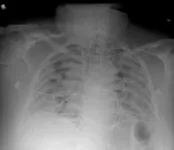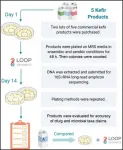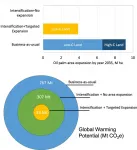Artificial intelligence tool uses chest X-ray to differentiate worst cases of COVID-19
2021-05-12
(Press-News.org) Trained to see patterns by analyzing thousands of chest X-rays, a computer program predicted with up to 80 percent accuracy which COVID-19 patients would develop life-threatening complications within four days, a new study finds.
Developed by researchers at NYU Grossman School of Medicine, the program used several hundred gigabytes of data gleaned from 5,224 chest X-rays taken from 2,943 seriously ill patients infected with SARS-CoV-2, the virus behind the infections.
The authors of the study, publishing in the journal npj Digital Medicine online May 12, cited the "pressing need" for the ability to quickly predict which COVID-19 patients are likely to have lethal complications so that treatment resources can best be matched to those at increased risk. For reasons not yet fully understood, the health of some COVID-19 patients suddenly worsens, requiring intensive care, and increasing their chances of dying.
In a bid to address this need, the NYU Langone team fed not only X-ray information into their computer analysis, but also patients' age, race, and gender, along with several vital signs and laboratory test results, including weight, body temperature, and blood immune cell levels. Also factored into their mathematical models, which can learn from examples, were the need for a mechanical ventilator and whether each patient went on to survive (2,405) or die (538) from their infections.
Researchers then tested the predictive value of the software tool on 770 chest X-rays from 718 other patients admitted for COVID-19 through the emergency room at NYU Langone hospitals from March 3 to June 28, 2020. The computer program accurately predicted four out of five infected patients who required intensive care and mechanical ventilation and/or died within four days of admission.
"Emergency room physicians and radiologists need effective tools like our program to quickly identify those COVID-19 patients whose condition is most likely to deteriorate quickly so that health care providers can monitor them more closely and intervene earlier," says study co-lead investigator Farah Shamout, PhD, an assistant professor in computer engineering at New York University's campus in Abu Dhabi.
"We believe that our COVID-19 classification test represents the largest application of artificial intelligence in radiology to address some of the most urgent needs of patients and caregivers during the pandemic," says Yiqiu "Artie" Shen, MS, a doctoral student at the NYU Data Science Center.
Study senior investigator Krzysztof Geras, PhD, an assistant professor in the Department of Radiology at NYU Langone, says a major advantage to machine-intelligence programs such as theirs is that its accuracy can be tracked, updated and improved with more data. He says the team plans to add more patient information as it becomes available. He also says the team is evaluating what additional clinical test results could be used to improve their test model.
Geras says he hopes, as part of further research, to soon deploy the NYU COVID-19 classification test to emergency physicians and radiologists. In the interim, he is working with physicians to draft clinical guidelines for its use.
INFORMATION:
Funding support for the study was provided by National Institutes of Health grants P41 EB017183 and R01 LM013316; and National Science Foundation grants HDR-1922658 and HDR-1940097.
Besides Geras, Shamout, and Shen, other NYU Langone researchers involved in this study are co-lead investigators Nan Wu; Aakash Kaku; Jungkyu Park; and Taro Makino; and co-investigators Stanislaw Jastrzebski; Duo Wong; Ben Zhang; Siddhant Dogra; Men Cao; Narges Razavian; David Kudlowitz; Lea Azour; William Moore; Yvonne Lui; Yindalon Aphinyanaphongs; and Carlos Fernandez-Granda.
Media Inquiries:
David March
212-404-3528
david.march@nyulangone.org
[Attachments] See images for this press release:

ELSE PRESS RELEASES FROM THIS DATE:
2021-05-12
The 'missing link' that helped our ancestors to begin communicating with each other through language may have been iconic sounds, rather than charades-like gestures - giving rise to the unique human power to coin new words describing the world around us, a new study reveals.
It was widely believed that, in order to get the first languages off the ground, our ancestors first needed a way to create novel signals that could be understood by others, relying on visual signs whose form directly resembled the intended meaning.
However, an international research team, led by experts from the University of Birmingham and the Leibniz-Centre General Linguistics (ZAS), Berlin, have discovered that iconic ...
2021-05-12
Lancaster scientists have demonstrated that other physicists' recent "discovery" of the field effect in superconductors is nothing but hot electrons after all.
A team of scientists in the Lancaster Physics Department have found new and compelling evidence that the observation of the field effect in superconducting metals by another group can be explained by a simple mechanism involving the injection of the electrons, without the need for novel physics.
Dr Sergey Kafanov, who initiated this experiment, said: "Our results unambiguously refute the claim of the electrostatic field effect ...
2021-05-12
Touchscreens are notoriously difficult to type on. Since we can't feel the keys, we rely on the sense of sight to move our fingers to the right places and check for errors, a combination of efforts we can't pull off at the same time. To really understand how people type on touchscreens, researchers at Aalto University and the Finnish Center for Artificial Intelligence (FCAI) have created the first artificial intelligence model that predicts how people move their eyes and fingers while typing.
The AI model can simulate how a human user would type any sentence on any keyboard design. It makes errors, detects them -- though not always immediately -- and corrects them, very much like ...
2021-05-12
Philadelphia, May 12, 2021 - The COVID-19 pandemic has resulted in an abrupt change in healthcare delivery, including a shift from in-person visits to telemedicine. However, a Canadian survey found that a significant proportion of cardiology trainees are uncomfortable with using telemedicine and feel that better preparation for new-tech medicine is needed. Experts draw attention to the need for a telemedicine curriculum that includes supervision to prepare trainees for the expanding role of telemedicine in cardiovascular care. Survey results are published in the Canadian Journal of Cardiology.
"Our outpatient care shifted almost overnight from in-person visits to providing care to patients via telephone or video platforms (known as telemedicine) as a result ...
2021-05-12
Philadelphia, May 12, 2021 - In recent years there has been an increased interest in the consumption of kefir, a fermented dairy beverage, because there is some evidence that it has health benefits and its affordability. A new study by researchers from the University of Illinois and The Ohio State University, published in JDS Communications, found that 66 percent of the commercial kefir products studied overstated microorganism density and 80 percent contained bacterial species that were not included on the label, potentially misleading consumers.
Senior author Kelly S. Swanson, PhD, University of Illinois, Urbana, ...
2021-05-12
A new study led by the Centre for Nutraceuticals in the University of Westminster shows that pink drinks can help to make you run faster and further compared to clear drinks.
The researchers found that a pink drink can increase exercise performance by 4.4 per cent and can also increase a 'feel good' effect which can make exercise seem easier.
The study, published in the journal Frontiers in Nutrition, is the first investigation to assess the effect of drink colour on exercise performance and provides the potential to open a new avenue of future research in the field of sports drinks and exercise.
During the study participants were asked to run on a treadmill for 30 minutes at a self-selected speed ensuring their rate of exertion remained consistent. Throughout the exercise ...
2021-05-12
For college students under pressure, a dog may be the best stress fighter around.
Programs exclusively focused on petting therapy dogs improved stressed-out students' thinking and planning skills more effectively than programs that included traditional stress-management information, according to new Washington State University research.
The study was published today in the journal AERA Open, a peer-reviewed journal of the American Educational Research Association. The paper demonstrated that stressed students still exhibited these cognitive skills improvements up to six weeks after completion of the four-week-long program.
"It's a really powerful finding," said Patricia Pendry, associate professor in WSU's Department of ...
2021-05-12
Researchers from University of Maryland, North Carolina State University, National Taiwan University, Oxford University, Kings College London, and Perceptronics Solutions, Inc. published a new paper in the Journal of Marketing that examines how artificial intelligence (AI)-based text analysis of social media can monitor the extent to which brand reputation rises and falls over time.
The study, forthcoming in the Journal of Marketing, is titled "Real-Time Brand Reputation Tracking using Social Media" and is authored by Roland Rust, William Rand, Ming-Hui Huang, Andrew Stephen, Gillian Brooks, ...
2021-05-12
INDIANAPOLIS -- Artificial intelligence (AI)-driven healthcare has the potential to transform medical decision-making and treatment, but these algorithms must be thoroughly tested and continuously monitored to avoid unintended consequences to patients.
In a JAMA Network Open Invited Commentary, Regenstrief Institute President and Chief Executive Officer and Indiana University School of Medicine Associate Dean for Informatics and Health Services Research Peter Embí, M.D., M.S., strongly stated the importance of algorithmovigilance to address inherent biases in healthcare algorithms and their deployment. ...
2021-05-12
A global team of researchers recently released the results of a 'data-rich' modeling approach designed to illustrate a range of what-if scenarios for future oil palm plantation development in Indonesia. The study provides new insight into crop production strategies available to an industry facing increasing scrutiny.
Oil palm production is challenged by global and domestic concerns related to how it operates within its tropical rainforest environment, which is highly valued for its contribution to climate change mitigation potential and biodiversity protection. The study sheds new light on the future implications of maintaining business-as-usual ...
LAST 30 PRESS RELEASES:
[Press-News.org] Artificial intelligence tool uses chest X-ray to differentiate worst cases of COVID-19





